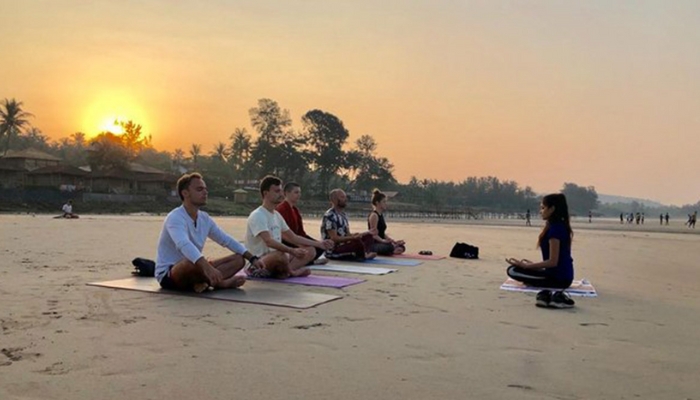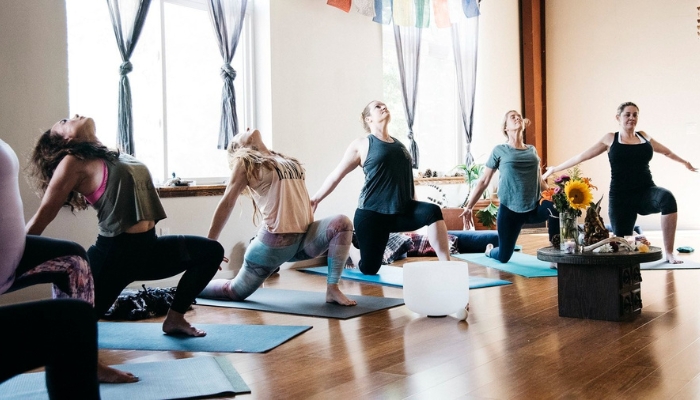
During a weekend getaway in rural Lincolnshire, the “smiling yogi” returns this ancient practice to its roots, focusing on mantras and mindfulness
When I’ve visited yoga studios in London, I’ve often found the groups to be predominantly white, slim, and middle class. It felt like I was in someone else’s space, and I wanted to connect with my Indian roots through authentic Indian yoga in the UK. However, finding a teacher was more challenging than I expected. According to a 2020 report, 91% of yoga practitioners in the UK who responded to the survey were white, highlighting a lack of diversity in the industry.
After some online searching, I discovered Ravi Dixit, a 36-year-old Indian yogi born in Ramaipur, Uttar Pradesh, now living in London and hosting retreats in the UK. Coming from a lineage of spiritual teachers, Dixit was raised with yoga practice from a young age. He believes authentic yoga is based on the values and principles of traditional Indian practice, serving as a guide to life rather than just a physical exercise.
And that’s how I find myself on a retreat in Lincolnshire, surrounded by 20 others, freely moving our bodies. After the invigorating 10-minute session of deep nasal breathing, I open my eyes to see people around me laughing, crying, or dancing with abandon. Usually, I might feel self-conscious in this moment, thinking, “We must look crazy.” But after spending time with Dixit, known as “the smiling yogi,” I feel completely at ease. I close my eyes and continue moving freely until the music stops abruptly, and Dixit starts vigorously moving his arms downward with a loud “hoo” sound.
“Let whatever you feel come out,” he encourages. “In the outside world, we often have to be polite and suppress our emotions. Here, you should release whatever emotions arise.”

No footwear is permitted inside The Vedanta, a grand yet welcoming Grade II-listed Elizabethan manor house near Branston. Quickly, it begins to feel like home as I recline on the sofa by the fire and ascend the broad wooden staircase in my socks. My room boasts high ceilings and expansive windows that offer views of the estate’s lake and the surrounding woodland. During breaks between classes, many of us seize the opportunity to wander the picturesque grounds and indulge in the spa’s whirlpool bath. Meals adhere to Ahimsa, the principle of non-harm to living beings. As such, we are treated to three daily meals of nutritious and delectable vegetarian and vegan fare, complemented by a continuous supply of fresh fruit and herbal tea.
The retreat accommodates individuals of all skill levels, ages, and ethnic backgrounds – a contrast to my experiences in many mainstream yoga classes
During the weekend’s eight hours of hatha yoga, there are moments when I feel my body has reached its limits. Led by Dixit from Friday evening to Sunday afternoon, we engage in four yoga sessions, each lasting about two hours. As a beginner, the intensity of the practice in such a short span challenges me. However, Dixit structures the sessions starting with small, repetitive movements, then progressing to stretches, more energetic flows, and holds, before concluding with “savasana,” the corpse posture. In savasana, we lie on our backs and Dixit encourages us to completely “surrender” our bodies for 10 minutes. He emphasizes that this surrender is a crucial aspect of the practice, promoting mindfulness through acceptance and observation of stillness.
The retreat accommodates individuals of all skill levels, ages, ethnicities, body types, and backgrounds, which contrasts with my experience in many mainstream yoga classes in London. Among the participants, there are several other South Asian women and three men. In our final class, Dixit notes that in India, yoga practice has traditionally been more male-oriented, unlike the female-dominated classes often seen in the West.
The authenticity of the sessions is enhanced by Dixit’s chanting of Sanskrit mantras, which feels like a timeless ritual preserved over millennia. As the scent of incense wafts around me and I hear his voice resonating with gratitude to various deities, I feel transported from Lincolnshire to India. “Understanding the history and purpose behind each posture makes the experience much more meaningful,” says fellow participant Narlep Kaur.
Dixit notes that yoga classes in the west tend to emphasize the physical aspect, known as “asana,” rather than the broader, holistic practice. “Many Western yoga styles focus solely on the physical body, aiming for weight loss, fitness, and sweating it out, often pushing ourselves too hard. But that’s not what yoga is about. Yoga teaches us to be kind to ourselves, not to be harsh or judgmental.”
A core message from Dixit is that yoga is inclusive and accessible to all. “While its origins are in Asia, yoga belongs to everyone. You don’t need fancy gear, long sessions, or hours of meditation. Yoga is about connecting with yourself wherever you are.”
After the retreat, I felt more in tune with my body, mind, and cultural heritage than ever before. The experience was transformative, and I gained a deeper understanding of myself without even looking in a mirror.
A three-day retreat at The Vedanta costs £550 for a single-occupancy room or £450 per person in a shared room. Ravi Dixit offers regular online and in-person yoga classes in Richmond, London, and will be opening a new boutique yoga resort in Goa in November 2024.



